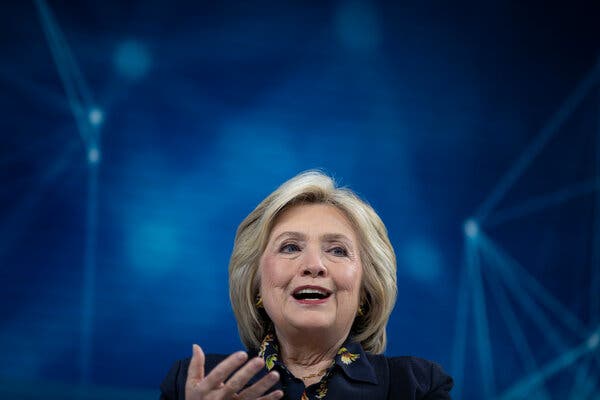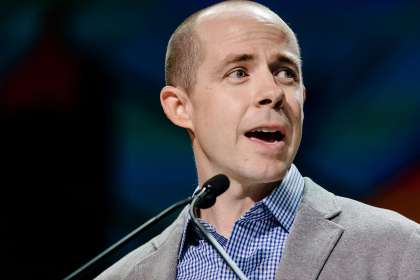George W. Bush on the USS Abraham Lincoln in 2003.
Stephen Jaffe/AFP/Getty Images
“Do you believe you could do a better job than President Bush in preventing another 9/11-type terrorist attack on the United States?”
That was the first question of the first presidential debate in 2004, posed to Sen. John Kerry by moderator Jim Lehrer. From that first presidential election after the Sept. 11 attacks to the 2020 campaign season, the 18-year war on terror has continued to color American politics.
Kerry, who fended off a surprisingly strong challenge from antiwar candidate Howard Dean during the primary, did say he could do a better job than Bush at keeping America safe from terror and emphasized his military service and record of foreign policy experience. Voters didn’t agree. Kerry’s “flip-flop” on the Iraq war and intervening events like the capture of Saddam Hussein and a last-minute message from Osama bin Laden didn’t help.
The post-9/11 shadow has remained over subsequent elections. In 2008, Barack Obama’s early opposition to the war in Iraq helped propel him to his party’s nomination and then the presidency. In 2012, he successfully defended his handling of the pullout from Iraq and the attack on a U.S. compound in Benghazi from Republican criticism. The 2016 election took place against the backdrop of the rise of ISIS in the Middle East and deadly jihadi attacks in San Bernardino, Orlando, and Paris. Donald Trump rode his promises to “bomb the shit” out of ISIS and completely shut down Muslim immigration to the U.S. straight to the White House.
The threat of 9/11-style terrorism in the West by jihadi groups like al-Qaida and ISIS has dwindled.
On Thursday, the Democratic candidates will take the debate stage a day after the 18th anniversary of the attack. Counterterrorism is certain to come up in the aftermath of the unexpected news that Trump had planned and then called off talks with the Taliban and the Afghan government at Camp David this week. It’s also quite possible we will hear former Vice President Joe Biden’s rivals criticize his vote to authorize military force in Iraq—and his shifting explanations of that vote—in order to impugn his claim to have the most foreign policy expertise in the race. Trump and his supporters, meanwhile, continue to focus their attacks on two Muslim congresswomen in an effort to make the race, as one of the president’s retweets recently put it, a “binary choice” between “ISIS” and “Make America Great Again.”
It feels like we’re still unable to move past the same post-9/11 politics. And yet, the terms of the debate are shifting.
For one thing, the threat of 9/11-style terrorism in the West by jihadi groups like al-Qaida and ISIS has dwindled. According to data from New America, there hasn’t been a single deadly jihadi attack on U.S. soil in 2019. (There’s been only one in Europe.) The most recent mass casualty attack was the 2017 lower Manhattan car ramming. As Dan Byman recently noted for Slate, after the El Paso, Texas, shooting last month, domestic right-wing extremists are responsible for more deaths on U.S. soil since 9/11 than jihadis. Not surprisingly, when Democratic candidates discussed “terrorism” in the first two debates, they were more likely to be talking about white supremacists than groups like al-Qaida and ISIS.
Americans are still concerned about terrorism, but it’s not as dominant an issue as it used to be. In 2002, 91 percent of Americans viewed international terrorism as a “critical threat,” according to survey data from the Chicago Council on Global Affairs. In 2016, it was 75 percent. Today, it’s 69 percent—in second place behind cyberattacks on U.S. computer networks.
In terms of all priorities, according to Pew, terrorism has fallen to fourth place behind the economy, health care, and education. While roughly 8 in 10 Americans viewed it as a priority for most of the early to mid-2000s, it’s down to 67 percent today.
For much of the past two decades, international terrorism and the military campaigns launched in response to it have felt like an emergency. Attacks in the United States and other Western countries happened with alarming regularity. U.S. troops were engaged in large numbers in combat in Afghanistan, Iraq, and Syria.
Today, attacks are rare and when they do occur, they have far less of a political impact than they used to, particularly amid frequent acts of domestic terror and mass shootings. Groups like ISIS and al-Qaida are still active and still deadly, but their violence is more likely to take place in conflict areas like Afghanistan, Somalia, or Iraq. U.S. troops are still killed in action, but—depressing as this is—not in high enough numbers to dominate the political conversation back home.
Meanwhile, the legal authorization for the war on terror, originally passed after 9/11, remains in effect despite recent congressional efforts to repeal it. It has been invoked to justify military action in more than a dozen countries, often against groups with only the most tenuous of connections to the attack. Periodically, a deadly attack alerts the public to the fact that the U.S. has troops operating in, say, Niger, but generally these are small operations conducted with special forces, drones, and local proxies, not the kind of large deployments that attract controversy and public backlash. In Somalia, to take one example, the U.S. military footprint is expanding rapidly with little public scrutiny. In the most dubious and dangerous stretch yet, Secretary of State Mike Pompeo has invoked the post-9/11 authorization to justify a potential military strike on Iran. The detention facility at Guantánamo Bay remains open—its inmates may soon require geriatric care.
Perhaps, as he fires his more hawkish advisers one by one, Trump might actually follow through on his pledge to bring U.S. troops home from Afghanistan and Syria. Perhaps, a new Democratic president will finally turn the page on the legal architecture and open-ended military commitments put in place over the past two decades in the name of fighting terrorism. Perhaps, the next race might finally be the first post-post-9/11 election.
But for now, even as actual occurrences of international terrorism become less common, Americans seem to be getting accustomed to the permanent war footing set up over the past 18 years. We may soon stop noticing it’s there at all.
Readers like you make our work possible. Help us continue to provide the reporting, commentary and criticism you won’t find anywhere else. Join Slate Plus.



